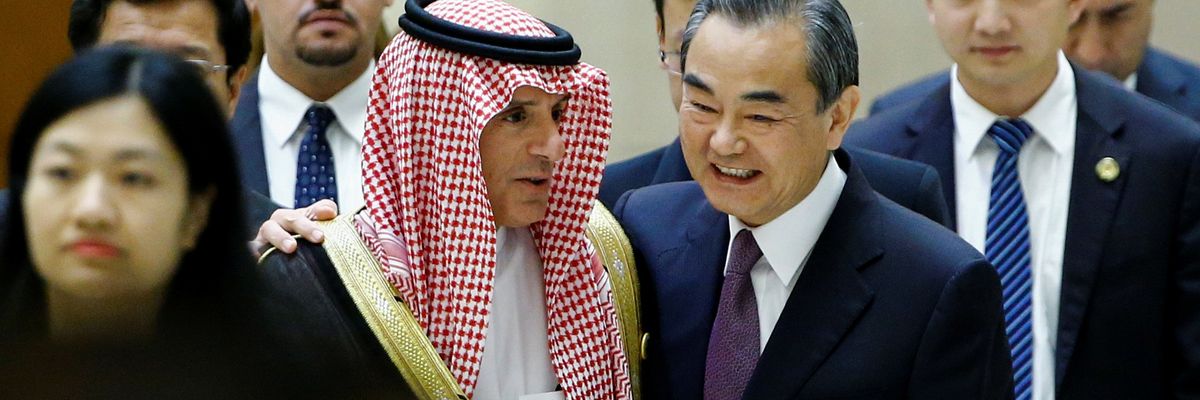A burst of diplomatic activity between China and Middle East countries has kicked off 2022. Chinese Foreign Minister Wang Yi last week hosted a delegation from the Gulf Cooperation Council, including the foreign ministers of Saudi Arabia, Kuwait, Oman, and Bahrain, as well as the GCC’s secretary general. They were immediately followed by the Turkish and Iranian foreign ministers. Beijing also made small waves with the announcement that Syria had signed a cooperation agreement to work with China on the Belt and Road Initiative, or BRI.
It was indeed a major week in China-Middle East, North Africa relations, but not without recent precedent. In 2021, Wang made two substantive trips to the region, visiting Saudi Arabia, Turkey, Iran, the UAE, Oman, and Bahrain in March, and then Syria, Egypt, and Algeria in July. Add to this State Councilor Yang Jiechi’s trip to Qatar and Kuwait in early 2021, and it is clear Beijing is devoting significant diplomatic resources in the region.
It is easy — but wrong — to attribute this solely to energy. China does rely heavily on the Gulf for its energy security, typically importing over 40 percent of its crude from MENA. However, the past year has demonstrated the increasingly multifaceted nature of China’s presence in the region, including a nascent but growing role in security affairs.
For example, during the Shanghai Cooperation Organization summit last August, Chinese President Xi Jinping announced that Iran would begin the process of becoming a full member, a goal for Tehran since at least 2008. Saudi Arabia, Egypt, and Qatar were all admitted as dialogue partners. The SCO has institutionalized security cooperation among its members through the Regional Anti-Terrorist Structure and the Collective Security Treaty Organization, which broadens cooperation on security, crime, and drug trafficking.
Other dramatic reports have recently indicated a Chinese military role on the Arabian Peninsula. In November 2021, The Wall Street Journal reported that Beijing was building a military facility in the UAE, a report that the Emirati government described as a mischaracterization of the project. “The UAE’s view was that these certain facilities in no way could be construed as military facilities,” UAE presidential adviser Anwar Gargash insisted last month at a meeting of the Arab Gulf States Institute in Washington. Shortly after, CNN reported that Saudi Arabia is actively manufacturing its own ballistic missiles with Chinese assistance.
Taken on its own, the China-MENA relationships are a fascinating expression of a growing geopolitical shift, as Asian and MENA countries, people, and markets continue to integrate more deeply. Asian countries constitute the largest markets for Gulf oil, making a natural economic synergy, and China’s appetite for Gulf energy is tremendous. Chinese companies have been major players in contracting across the region over the past two decades. Add to this the BRI, linking markets and supply chains across the Indian Ocean and Eurasia, and it becomes clearer that MENA stability is an important component of BRI’s success, and therefore of Beijing’s foreign policy.
However, the China-U.S.-MENA triangle adds a complicating layer to the story. Like other extra-regional countries operating in MENA, Beijing has benefited from a Washington’s security umbrella that allowed it to develop a deep presence without undertaking corresponding security commitments. This was not a problem when the U.S.-China relationship was in good shape, but, as the bilateral relationship has deteriorated in recent years, tensions between them have started to play out in countries and regions where both powers have deep interests.
The Middle East is clearly one such region. The strategic competition framework adopted by Washington is having an impact on the foreign policy of its allies and partners throughout MENA. “What we are worried about is this fine line between acute competition between China and the U.S. and a new Cold War,” Gargash observed.
The visits to China from MENA foreign ministers must be seen in this larger context. Leaders across the region are concerned about becoming a theater of great power competition. At the same time, they worry about the ever-present prospect of U.S. disengagement as the latter’s attention shifts to the Indo-Pacific. Managing the relationship with Washington while strengthening ties to Beijing has become a tough balancing act, but an increasingly important one; everyone is hedging.
The meetings themselves yielded little in the way of substantive pledges or new initiatives. There was talk of continuing to work toward a completed China-GCC free trade agreement; this has been on the table since 2004. Wang and Iran’s Foreign Minister Hossein Amir-Abdollahian said the two countries had started the implementation stage of the comprehensive strategic partnership signed in March 2020 but under development since 2016.
Wang also re-emphasized China’s 5-point initiative for MENA security announced during his 2021 trip to Saudi Arabia. Calling on MENA states to respect each other, uphold equity and justice, achieve nuclear non-proliferation, jointly foster collective security, and accelerate development cooperation, the initiative is vague and fails to articulate a framework for implementation. The press release describing Turkish Foreign Minister Mevlüt Çavuşoğlu’s visit claimed that he had expressed Turkey’s expectations and sensitivities about the treatment of Uyghurs, always an important talking point for Ankara. And while he did not travel with the delegation to Beijing, UAE Foreign Minister Sheikh Abdullah bin Zayed spoke with Wang over the telephone to discuss areas of cooperation and support.
None of this fundamentally changed anything. It just reaffirms what we have been watching unfold: China has become an important political actor in the Middle East. It has been articulating an increasingly ambitious regional presence, and MENA leaders are receptive. In a press release after his guests had all returned home, Wang asserted that there is “no power vacuum” in the Middle East and thus no need for “a foreign patriarch” to interfere in the region. He is telling MENA that China has a different way of engaging the region, that there is an alternative to the United States. Whether or not this turns out to be the case, the message resonates.
















